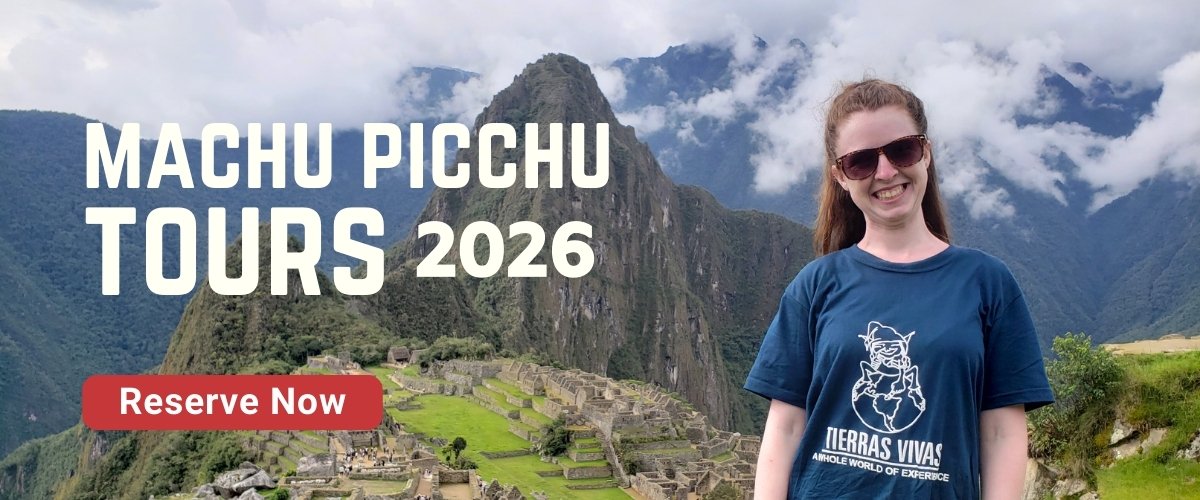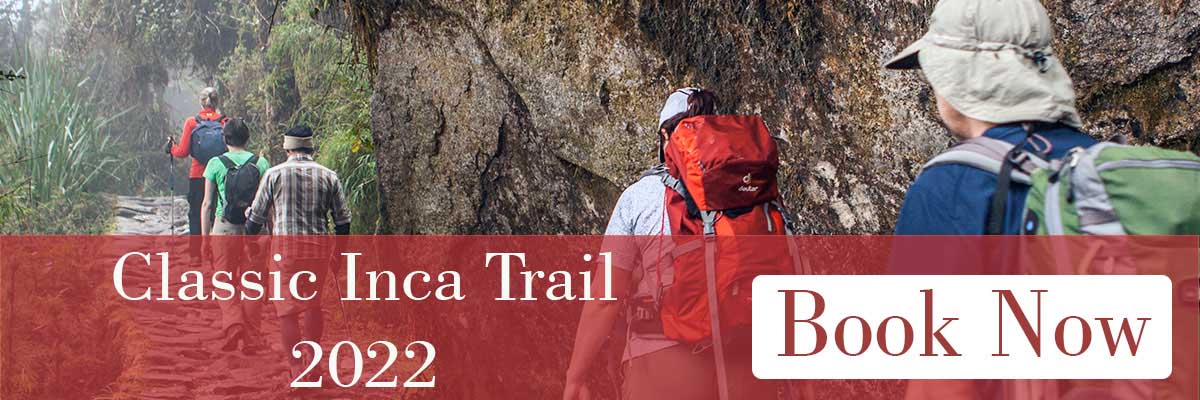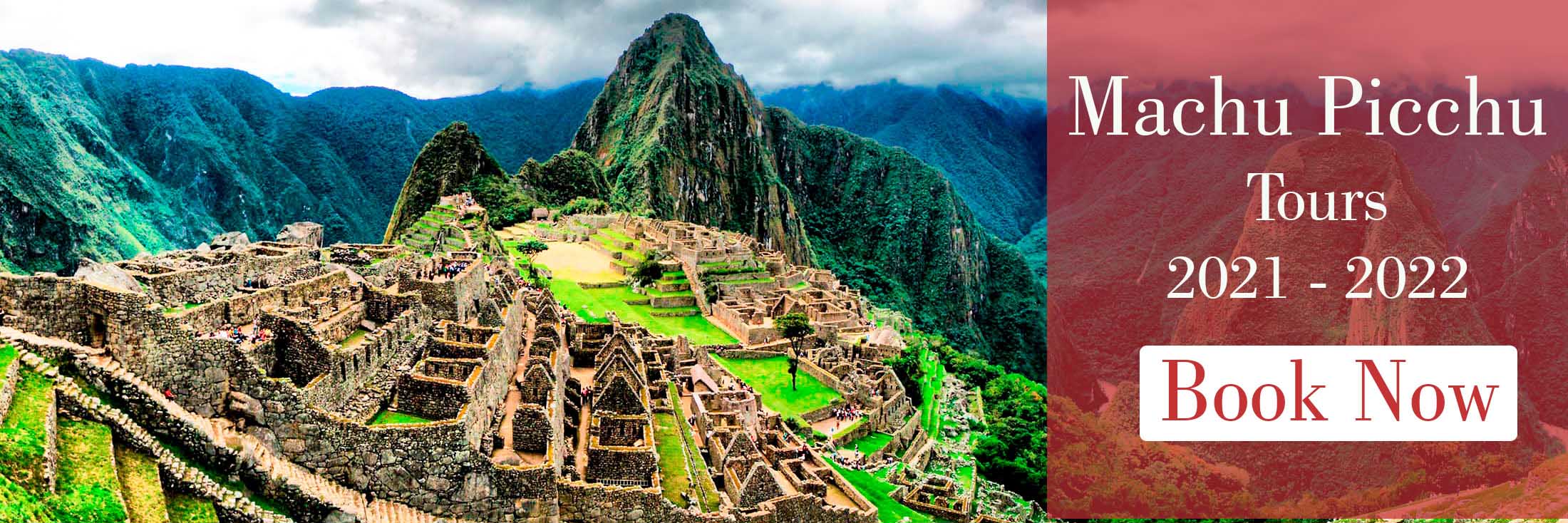Peru’s historical legacy is long and rich that stretches back to ancient cultures like Caral (3,000 BC) and extended until the reign of the Inca Empire (1,200AC). All Peru ethnic groups’ cultures and traditions make South America’s third-largest country a bucket list staple. There is a world of experiences beyond the ancient to discover in the Peruvian territory. Sunbathe and surf on the Pacific Ocean beaches; take a tour of historic pre-Inca, Inca structures, and Spanish colonial towns. Soar the Andean blue sky via zip line through the canopy of the world’s largest rainforest, covering nearly half of the country, trek the Peruvian highland trails below the cloud-topped Andean mountains, the second largest continental range in the world, discover the mysterious Nazca lines, sail on the highest navigable lake in the world Titicaca. Today all these destinations are reopened with a total capacity but with new rules such as 2023 Machu Picchu rules.
Today all travelers are asking “Is it safe and secure to visit Peru”. Is it possible to visit Machu Pichu?
Peru is a safe travel destination now! Things have gone back to normal after the Covid pandemic, as the Peruvian government took a number of health safety measures and most of us were vaccinated, and then we just experienced social unrest with a lot of strikes which finally stopped so now Peru is a safe tourist destination and all tourist attractions are operating at 100% capacity.
RELATED: DO YOU NEED A VISA TO TRAVEL TO PERU?
PERU TRAVEL: Table of Contents
- Peru Travel Restictions (Updated)
- Peru "Safe Travels" by WTTC
- Coronavirus in Peru
- Health and Safety Protocols to Visit Machu Picchu after Covid-19
- Inca Trail and Machu Picchu Cancellation Policy
- Ministerio de Cultura
- PeruRail & Inca Rail Train Tickets
- Was It Safe to Visit Machu Picchu During the Coronavirus?
- Coronavirus - World Health Organization
RELATED: PERU TRAVEL INSURANCE
Peru Travel Restrictions
Please find below the Peru Travel restrictions. Every month the Peruvian government decrees new safety measures for traveling in Peru:
The latest, at a glance (Updated March, 8 2023)
- Peru has gone back to normal after the social unrest and is now a safe country to travel throughout all its regions, coastal region, Andean region, and jungle region. All roads blockage were clear, domestic flights and public transportation are operating 100%,
Updated February, 16 2023
Due to sometimes violent protests and road blockades in various parts of the country, it is recommended to refrain from non-essential travel within Peru for the time being. On February 14, 2023, the government extended the state of emergency for Lima, Callao, the Panamericana Sur, Panamericana Norte, Central highways and the Apurimac-Cusco-Arequipa Sur and Intaroceania Sur roads by a further 30 days.
The state of emergency for Cusco, Puno, Apurimac, Tacna and Madre de Dios was extended for another 60 days on February 5th, 2023.
The international airport in Lima/Callao is operational, but strict access controls are enforced (access only with a valid flight ticket).
Updated January, 20 2023
Recent political developments have provoked ongoing social unrest in many parts of the country, with demonstrations, road blockades and confrontations with the security forces, often escalating into violent riots, which have already resulted in numerous deaths and injuries. In particular, regions in which Peru's main tourist attractions are located are affected. The feasibility of tourist activities in, around and between Arequipa, Puno (Lake Titicaca), Puerto Maldonado, Cusco (including the Sacred Valley and Machu Picchu), Ayacucho as well as Tarapoto and Cajamarca is not guaranteed. It is also to be expected that shops and service providers will remain closed on a daily basis and public transport will be temporarily suspended in the locations currently affected. Travel in these areas can be associated with lengthy delays, severe restrictions and significant risks to health and life. Over a period of several days, it is difficult to foresee at which exact locations and routes such acute hindrances and hazards will occur. Airports in the interior of Peru can also be temporarily closed so that a quick exit cannot always be guaranteed.
Updated July, 9 2022
- All travelers entering the country must complete the following sworn statement (Affidavit of Health and Geolocation Authorization).
-
Peruvians and resident foreigners aged 18 years and older, must show, before boarding the plane, their COVID-19 vaccination card with the three doses applied in Peru or abroad.
Likewise, people aged 12-17 years, must show, before boarding the plane, their COVID-19 vaccination card with the first and second doses applied in Peru or abroad, otherwise, they must show a negative molecular test issued up to 48 hours before boarding. Children under 12 years old are only required to be asymptomatic to board.
- Non-resident foreigners, must show, before boarding the plane, their COVID-19 vaccination card, according to the vaccination schedule of their country of origin.
-
For domestic flights and interprovincial land travel, passengers over 12 years old, residents and non-residents will show before boarding their COVID-19 vaccination card with the first and second doses applied in Peru or abroad, and the booster for those over 18 years old residing in Peru and who are qualified to receive it according to current protocol. Otherwise, they must show a negative molecular test issued up to 48 hours before boarding.
Children under 12 years old are only required to be asymptomatic to board.
- For entrance to enclosed spaces, those over 18 years old residing in Peru shall show their COVID-19 vaccination card with the three doses applied in Peru or abroad, only if they are qualified to receive it according to current protocol.
- It is mandatory to wear a KN95 mask or, in replacement, a three-fold surgical mask and, on top of it, a cloth mask, to circulate on public roads and in closed places.
- In regions with 80% vaccination coverage against COVID-19 of people aged 60 years and over with 3 doses and 80% vaccination coverage against COVID-19 of people aged 12 years and over with 2 doses, the use of masks in open spaces is optional, provided that physical or bodily distancing is guaranteed, measures that could be modified according to the epidemiological context.
- It is important to constantly wash hands, avoid crowds and maintain social distance.
RELATED: GUIDELINE FOR TRAVELING TO PERU
Updated January, 31 2021
- All travelers entering the country must complete the following sworn statement (Affidavit of Health and Geolocation Authorization).
- All travelers 12 years and older entering the country must show their COVID-19 vaccination card with the completed dose. Otherwise, they must show a negative molecular test issued up to 48 hours prior to boarding. Children under 12 years old are only required to be asymptomatic to board.
- For domestic flights, passengers over 12 years old, will only be able to board if they prove to be fully vaccinated, either in Peru or abroad. Those over 40 years old will need to accredit the booster dose, otherwise they must show a negative molecular test issued up to 48 hours prior to boarding.
- The use of face shields is no longer required to board domestic and international flights
- For interprovincial land transportation, passengers over 18 years old, will only be able to board if they prove to be fully vaccinated, either in Peru or abroad. Those over 40 years old will need to accredit the booster dose, otherwise they must show a negative molecular test issued up to 48 hours prior to boarding.
- For enclosed places, visitors over 18 years old, whether Peruvian or foreign, will only be able to enter if they prove to be fully vaccinated, either in Peru or abroad. Those over 40 years old will need to accredit the booster dose.
- It is mandatory to wear a KN95 mask or, in its replacement, a three-fold surgical mask with a fabric mask over it to circulate on public spaces and in enclosed places.
- It is important to wash hands constantly, avoid crowds and keep social distance
- These measures will be in force from January 31, 2022 to February 13, 2022, according to SUPREME DECREE No. 010-2022-PCM
Updated November, 29 2021
- All travelers entering the country must complete an affidavit.
- Before boarding the plane, all travelers 12 years of age or older must show a vaccination card with the required doses completed up to 14 days before the flight. Otherwise, those travelers must show a negative molecular test issued up to 72 hours before boarding. Children under twelve only need to be asymptomatic to board.
- European tourists who land in Lima (with the exception of the United Kingdom) are allowed to re-enter!
- European airlines are now allowed to fly to the international airport in Lima again (exception: United Kingdom)
- Every tourist entering Peru must undergo an antigen test. The test is made available at the airport and the result is available after 30 to 60 minutes. The tourist bears the costs.
- If the result is NEGATIVE, the tourist can drive straight to his hotel as planned.
- If the result is positive, a quarantine will be ordered.
- The entry of non-resident passengers from South Africa or who have made a stopover in said country in the last 14 days is suspended until December 12.
- Quarantine time is canceled for travelers entering the country with the exception of Peruvians and foreign residents from South Africa or anyone who have made a stopover in that country, who must carry out a mandatory quarantine at their home, accommodation or other temporary isolation center for 14 days counting from the day of arrival in Peru.
- The use of a face shield is no longer required to board national or international flights.
- Moderate alert level: Free circulation hours are from 04:00 am to 02:00 am of the next day
- High alert level: Free circulation hours are from 04:00 am to 11:00 pm.
| MODERATE ALERT LEVEL | HIGH ALERT LEVEL |
| Amazonas, Áncash (Aija, Antonio Raimondi, Asunción, Bolognesi, Carhuaz, Carlos Fermín Fitzcarrald, Casma, Corongo, Huaraz, Huari, Huarmey, Huaylas, Mariscal Luzuriaga, Ocros, Pallasca, Pomabamba, Recuay, Sihuas, Yungay), Apurímac, Arequipa, Ayacucho (Cangallo, Huanca Sancos, Huanta, La Mar, Lucanas, Parinacochas, Páucar del Sara Sara, Sucre, Víctor Fajardo, Vilcashuamán), Cajamarca, Callao, Cusco, Huancavelica (Acobamba, Angaraes, Castrovirreyna, Churcampa, Huaytará, Tayacaja), Huánuco, Ica, Junín (Chanchamayo, Chupaca, Huancayo, Jauja, Junín, Satipo, Tarma, Yauli), La Libertad (Ascope, Bolívar, Gran Chimú, Julcán, Otuzco, Pacasmayo, Pataz, Sánchez Carrión, Santiago de Chuco, Trujillo), Lambayeque, Lima, Loreto, Madre de Dios, Moquegua, Pasco, Piura (Ayabaca, Huancabamba, Morropón, Paita), Puno, San Martín, Tacna, Tumbes, Ucayali. | Áncash (Santa), Ayacucho (Huamanga), Huancavelica (Huancavelica), Junín (Concepción), La Libertad (Chepén, Virú), Piura (Piura, Sechura, Sullana, Talara). |
- Before boarding buses, all passengers ages 45 or older must show a vaccination card with the completed required doses. Otherwise, they will not be able to travel.
- The use of a KN95 face mask is mandatory throughout the country or, instead, the use of double masking with a 3-layer surgical mask along with a cloth mask in closed places.
- The population is reminded constantly of the importance of hand washing, avoiding crowds and maintaining social distance
Updated August 10, 2021
The Peruvian government issued a state of emergency and closed the borders and cities immediately when the virus appeared. President Vizcarra declared a quarantine effect from 16 March until 30 September 2020. During this time, neither Peruvians nor foreigners could move on the streets. Also, he issued an updated travel advisory allowing flights to only repatriate Peruvians and return foreigners to their home countries. During the first week of October 2020, all Peruvian borders reopen!.
From 1 March, 2021, all Peru movement restrictions have been lifted to visit tourist attractions operating at 40% capacity
Promperu (a state agency in charge of the promotion of Peru) and MINCETUR (the Ministry of Foreign Trade and Tourism) declared about the tourism problems of the country. All local tour operators, travel agencies, hotels, Tour Guides, etc. were stopped due to the pandemic. The MINCETUR overseed the implementation of health and safety protocols in Cusco and Lima. It was to reactivate tourism in the months following the quarantine.
- Travelers entering the country must fill out a sworn statement (Affidavit of Health and Geolocation Authorization) and also provide the following before boarding the plane: a negative PCR test issued up to 72 hours before boarding or a negative antigen test issued up to 24 hours before boarding.
- The entry of non-resident passengers from South Africa, Brazil and / or India or anyone who have made a stopover in said countries in the last 14 days is suspended until August 22.
- Quarantine is canceled for travelers entering the country with the exception of Peruvians and foreigners residing from South Africa, Brazil and / or India or anyone who have made a stopover in those countries, who must carry out a mandatory quarantine at their home, accommodation or other temporary isolation center for 14 days from arrival in Peru.
- The use of a face shield is no longer required to board national or international flights.
Moderate alert level: Circulation hours are from 04:00 to 00:00.
High alert level: Circulation hours are from 04:00 to 00:00.
Very High alert level: Circulation hours are from 04:00 to 22:00 with vehicle restriction on Sundays.
- The use of a mask is mandatory throughout the country, as well as the use of double masks in closed places, such as airports, shopping centers, banks, supermarkets, among others.
- The population is reminded of constant hand washing, avoiding crowds and maintaining social distance.
Updated June 4, 2021
The Peruvian Government declared the National State of Emergency to control COVID19. Therefore, the Ministry of Foreign Trade and Tourism (MINCETUR) and the Commission for the Promotion of Peruvian Exports and Tourism (PROMPERU) announce the following:
- Travelers entering the country must fill out a sworn statement and also provide the following before boarding the plane: a negative molecular test (PCR), a negative antigen test or a medical certificate of epidemiological discharge. PCR or antigen test results must be obtained no later than 72 hours prior to check-in.
- The entrance of non-resident passengers from India, South Africa and/or Brazil, or who have made a stopover in such countries in the last 14 days, is suspended until May 30.
- Quarantine is not required any more for travelers entering the country, except for Peruvians and foreign residents from South Africa, Brazil and/or India or who have made a layover in those countries, they must mandatorily quarantine at their home, accommodation or other temporary isolation center for a period of fourteen 14 days from the date of arrival in Peru.
- The only requirement for domestic air travel is the signature of a sworn statement indicating that the traveler does not have symptoms of COVID-19.
- The use of masks to move around the country is mandatory, however, the Ministry of Health of Peru recommends double masking as a preventive measure.
- The use of face shields and double masking is mandatory when going to shopping malls, galleries, department stores, markets, supermarkets, stores and drugstores throughout the country.
- We remind the population to frequently wash their hands and keep social distancing.
- Moderate alert level: The movement of people schedule is from 04:00 h to 23:00 h. Vehicles will be able to run from Monday to Sunday in the region of Loreto (Maynas, Alto Amazonas, Loreto, Mariscal Ramón Castilla, Requena, Ucayali, Datem del Marañón and Putumayo)
- High alert level: The movement of people schedule is from 04:00 h to 22:00 h, with vehicle restriction on Sundays in the region of Ucayali (Coronel Portillo, Atalaya, Padre Abad and Purús).
- Very high alert level: The movement of people schedule is from 04:00 h to 21:00 h, with vehicle restriction on Sundays in the regions of Amazonas (Chachapoyas, Bagua, Bongará, Condorcanqui, Luya, Rodríguez de Mendoza and Utcubamba), Áncash (Huaraz, Aija, Antonio Raimondi, Asunción, Bolognesi, Carhuaz, Carlos Fermín Fitzcarrald, Casma, Corongo, Huari, Huarmey, Huaylas, Mariscal Luzuriaga, Ocros, Pallasca, Pomabamba, Recuay, Santa, Sihuas and Yungay), Apurímac (Abancay, Andahuaylas, Antabamba, Cotabambas, Chincheros and Grau), Arequipa (Arequipa, Camaná, Caravelí, Castilla, Condesuyos and La Unión), Ayacucho (Huamanga, Cangallo, Huanca Sancos, Huanta, La Mar, Páucar del
Sara Sara, Sucre, Víctor Fajardo and Vilcashuamán), Cajamarca (Cajamarca, Cajabamba, Celendín, Contumazá, Cutervo, Hualgayoc, Jaén, San Marcos, San Miguel, San Pablo and Santa Cruz), Callao (Callao), Cusco (Acomayo, Anta, Calca, Canas, Chumbivilcas, Espinar, La Convención, Paruro, Paucartambo, Quispicanchi and Urubamba), Huancavelica (Huancavelica, Acobamba, Angaraes, Castrovirreyna, Churcampa, Huaytará and Tayacaja), Huánuco (Huánuco, Ambo, Dos de Mayo, Huacaybamba, Huamalíes, Leoncio Prado, Marañón, Pachitea, Puerto Inca, Lauricocha
and Yarowilca), Ica (Ica, Chincha, Nasca, Palpa and Pisco), Junín Huancayo, Concepción, Chanchamayo, Jauja, Junín, Satipo, Tarma, Yauli and Chupaca), La Libertad (Trujillo, Ascope, Bolívar, Julcán, Pacasmayo, Pataz, Sánchez Carrión, Santiago de Chuco, Gran Chimú and Virú), Lambayeque (Chiclayo, Ferreñafe and Lambayeque), Lima (Lima,
Barranca, Cajatambo, Canta, Cañete, Huaral, Huarochirí, Huaura, Oyón and Yauyos), Madre de Dios (Manu and Tahuamanu), Moquegua (Mariscal Nieto, General Sánchez Cerro and Ilo), Pasco (Pasco, Daniel Alcides Carrión and Oxapampa), Piura (Piura, Ayabaca, Huancabamba, Paita, Sullana, Talara and Sechura), Puno (Puno, Azángaro, Carabaya, Chucuito, El Collao, Huancané, Lampa, Moho, San Antonio de Putina and Sandia), San Martín (Bellavista, El Dorado, Huallaga, Lamas, Mariscal Cáceres, Picota, Rioja, San Martín and Tocache), Tacna (Tacna, Candarave, Jorge Basadre and Tarata) and Tumbes (Tumbes, Contralmirante Villar and Zarumilla). - Extreme alert level: The movement of people schedule remains from Monday to Saturday from 04:00 h to 21:00 h, Apurímac (Aymaraes), Arequipa (Caylloma and Islay), Ayacucho (Lucanas and Parinacochas), Cajamarca (Chota and San Ignacio), Cusco (Canchis), La Libertad (Chepén and Otuzco), Madre de Dios (Tambopata), Piura (Morropón), Puno (Melgar, San Román and Yunguyo) and San Martín (Moyobamba).
- These measures will be in force from June 4 to 20, 2021.
Updated April 22, 2021
- Travelers entering the country must fill out a sworn statement and also provide the following before boarding the plane: a negative molecular test (PCR), a negative antigen test or a medical certificate of epidemiological discharge. PCR or antigen test results must be obtained no later than 72 hours prior to check-in.
- Travelers entering the country must comply with a mandatory 14-day quarantine. However, upon arrival in Peru, visitors will be able to undergo an antigen test. A negative result of this test will eliminate the quarantine. The passenger must pay for the test.
- If the traveler plans to stay in Peru for a period less than 14 days, he or she must undergo an antigen test or PCR test with negative results in order to continue his or her trip and eliminate the 14-day quarantine. (List of laboratories performing molecular tests for the diagnosis of COVID-19)
- The entrance of non-resident passengers from United Kingdom, South Africa and/or Brazil, or who have made a stopover in such countries in the last 14 days, is suspended until May 9.
- Land borders are temporarily closed; therefore, international passenger transportation by land is suspended. Peruvians and foreign residents may enter the country by complying with the protocols and measures established by the Ministry of Health.
- The only requirement for flights to the interior of the country (local flights) is the signature of a sworn statement indicating that the traveler does not have
- symptoms of COVID-19.
- High alert level: The movement of people schedule is from 04:00 h to 22:00 h, with vehicle restriction on Sundays in the regions of Loreto (Maynas, Alto Amazonas, Loreto, Mariscal Ramón Castilla, Requena, Ucayali, Datem del Marañón and Putumayo).
- These measures will be in force from April 19 to May 9, 2021.
- The use of mask to move throughout the country is mandatory and the population is reminded of hand washing and social distancing constantly.
Updated March 15, 2021
The Peruvian Government has taken new measures to fight against COVID-19:
- Travellers will be able to enter Peru by showing their molecular test (PCR). Once arrival in Peru, visitors will be able to take an antigen test. A negative result will eliminate the mandatory 14-day quarantine. The extra cost of the test shall be borne by the passenger.
- The entrance of non-resident passengers travelling from United Kingdom, South Africa and/or Brazil, or who have made a stopover in such countries in the last 14 days, is suspended from March 15 to 28. Peru's land borders remain temporarily closed.
- The only requirement for flights to the interior of the country (local flights) is the signature of an affidavit stating that no symptoms of COVID-19 are present.
- High alert level: The movement of people schedule is from 04:00 h to 22:00 h, with vehicle restriction on Sundays in the regions of Huánuco and Piura.
Updated March 11, 2021
The Minister Claudia Cornejo (MINCETUR) announced that the COVID-19 quarantine will be suspended for travelers arriving from abroad to Peru. She indicated that now travelers must present a discard document to stay in the country. The details will be given by the Ministry of Transport and Communications this Friday.
Updated February 28, 2021
Lockdown in Lima and other extreme-risk regions has been lifted. These are the new measures to take effect between March 1-14, 2021:
- Curfew will be between 21:00 and 4:00, and social immobilization will be all day Sunday.
- All travelers arriving internationally to Peru must quarantine for 14 days, in addition to the negative PCR test issued no more than 72 hours before travel.
- 40% capacity at stores selling necessities: supermarkets, pharmacies, bodegas, etc.
- Pharmacies’ delivery service can operate 24 hours.
- 20% capacity at malls, department stores, outdoor spaces for performing arts.
- 30% capacity at restaurants; Delivery services between 4am and 11pm.
- 40% capacity at banks and other financial institutions.
- 40% at salons, spas, barber shops and related businesses.
- 30% capacity at libraries, museums, archaeological monuments, cultural centers, galleries, zoos, botanical gardens, etc.
- 20% capacity at educational & cultural spaces.
- 50% to 100% capacity for interprovincial land transportation, regulated by the Ministry of Transport and Communications (MTC).
Machu Picchu and Inca Trail reopen in March. You can in advance the tickets and permits for your trip.
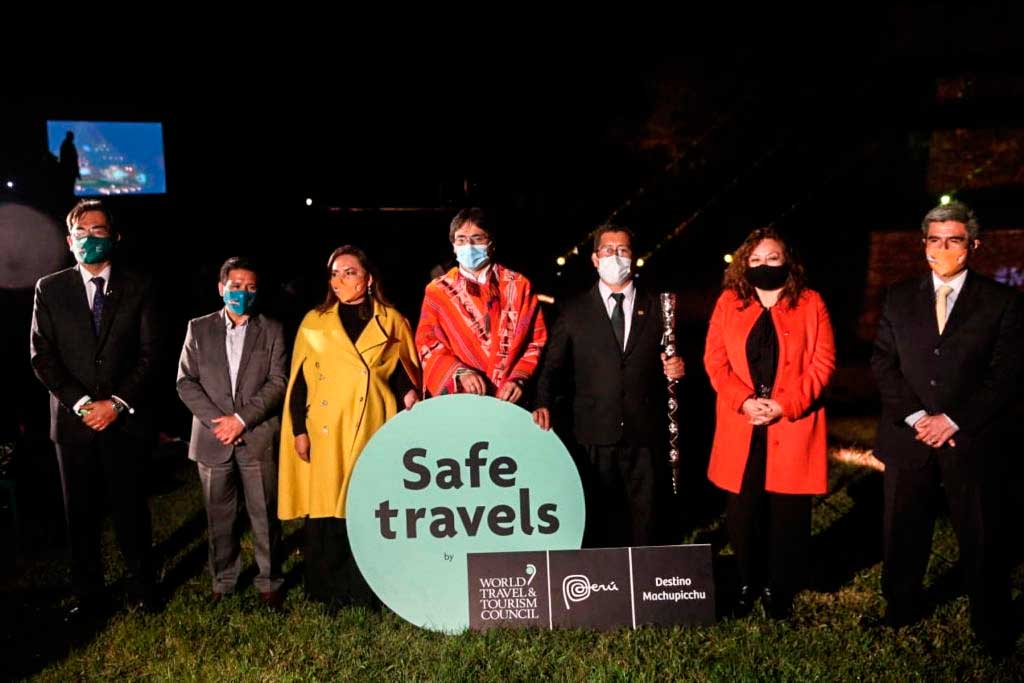
Peru Travel: "Safe Travels" by WTTC
In a ceremony held in Machu Picchu (Cusco) on 13 October, Peru received from the World Travel and Tourism Council (WTTC) the SAFE TRAVELS seal, the world's first safety and hygiene seal in tourism!!!
In a statement, the Ministry of Foreign Trade and Tourism (Mincetur) detailed that WTTC created the “Safe Travels” seal in order to contribute to the responsible and safe reopening of tourism, once the local authorities determine that the conditions exist for it. Therefore, the entity developed a set of protocols designed under the guidelines of the World Health Organization (WHO) and the Center for Disease Control and Prevention (CDC). This seal also has the backing of the World Tourism Organization (WTO) and more than 200 CEOs of the main business groups in the sector. Minister Rocío Barrios remarked that the biosecurity protocols issued by the Peruvian Executive regarding the tourism sector were evaluated by WTTC professionals and have their approval, which allows our country to have world-class health security standards in tourism. The ceremony was attended by the president of the Council of Ministers, Walter Martos, and the Japanese citizen Jesse Katayama, who became the first tourist to enter Machu Picchu after being reopened to the public in the context of the COVID-19 pandemic.
Peru is one of the most important destinations in the world and one of the first to obtain the Safe Travels seal from the WTCC.
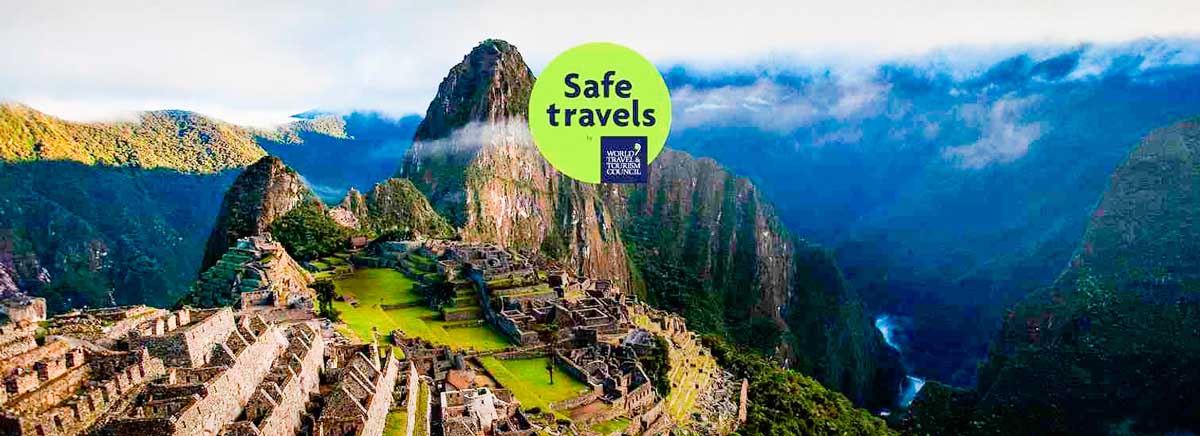
Coronavirus in Peru (COVID-19)
The virus keeps having a global impact. The U.S. government has established a state of emergency. This meant travel companies, leading airlines, and cruises had to cancel their routes. Italy, France, China, Iran, South Korea, and Europe were in quarantine. Some parts of Europe suffer from the 2nd wave nowadays applying local lockdowns.
In general, there is a higher risk for older travelers and those having a chronic disease. For that reason, it is recommended that these tourists reconsider traveling. If they travel, they should always follow strict hygienic rules such as washing their hands frequently, wear a mask/respirator, monitor their health and limit interactions with others for a period of 14 days after returning from a journey.
Is there COVID-19 in Peru?
Yes. The first case of COVID-19 in Peru was reported in March 2020. According to the latest reporting of the MINSA PERU, there are 677,987 (PCR) and 949,007 (Test Covid) cases in Peru, the total is 10.83% as of Decenber 13, 2021. We continue to closely monitor this situation, and protocols continue to be set and enforced by the government.
Peru received the first vaccines from china against covid. The Ministry of Health published a map where vaccination in different regions of the country can be seen in real time. To date there are 23,578.016 registered that recieved the first dossis of vaccination, 20,097489 recievitin the second dossis and total dosses administered (1st and 2nd dossis) 43,675,505. In Lima there are 5,188,767 vaccinated, being the region with the highest number of doses applied, followed by La Libertad with 2,759,871 vaccinated. Of the total of this first batch, 84.5% have just been vaccinated.
This is the Map of the vaccinated in Peru in the real time
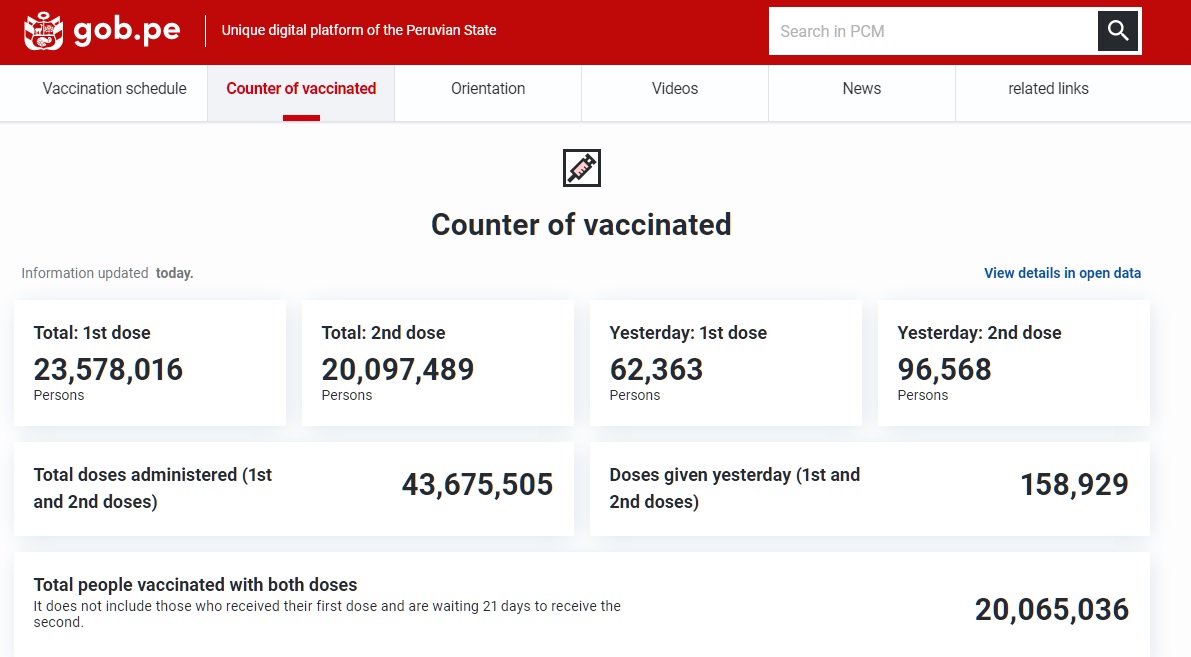
Health and Safety Protocols to Visit Machu Picchu after Covid-19
On the 15th October 2021, the Ministry of Foreign Trade and Tourism of Peru issued the new necessary regulation called the "Health Guidelines for COVID-19 for Tourist Destinations".
It will form a framework for private and public subjects operating in tourism to prevent, monitor, and check the spread of the coronavirus.
Following the regulation, the first health and safety protocols to visit Machu Picchu after the coronavirus have been implemented by the Cusco office of the Ministry of Culture and SERNANP (a public organization attached to the Ministry of the Environment).
The Most Important Parts of the Protocols Include the Following Points:
- All Trains can operate 100% of the capacity of their seats. The ordered distance between passengers will be met.
- Shuttle buses operating the route between Aguas Calientes to Machu Picchu can operate with the total capacity.
- However, there is an option to ascend on foot from Aguas Calientes to the Inca citadel
- The Machu Picchu tickets reopen to a total capacity of 100%. The Peruvian government created new circuits to visit the Inca city.
- Only 500 visitors/hour can enter Machu Picchu (the Archaeological Zone). (5000 visitors per day)
- The first time of entry is 6 am and the last is 4 pm. Surely, more visiting hours will be added later.
-
According to the new protocols, any visitor has to enter with a company of a professional Tour Guide, who will be responsible to meet the protocols.
- Tour Guides can only enter with a group of a maximum of 10 people and maintain a distance of 20 meters from other groups.
- To visit Machu Picchu, four routes will be considered: Only Machu Picchu (Circuit 1, 2), Huayna Picchu mountain (Circuit 4), Machu Picchu mountain (Circuit 3), Huchuy Picchu mountain (Circuit 3), Puente Inca (Circuit 1, 2)
- "La casa del Vigilante" will be the point of explanation.
Safety Rules for Visitors:
- Mandatory use of masks.
- Do not share personal hygiene items or food with other tourists.
- Clean your hands frequently (eg. washing with soap and water, or use of antiseptic).
- Use disposable tissues and dispose of them properly in a litter bin with a lid immediately afterwards.
- In case of sneezing or coughing, cover your nose and mouth with a disposable tissue or your forearm.
- Maintain environments clean and ventilated.
- Check your body temperature every 12 hours.
Inca Trail and Machu Picchu Cancellation Policy
Machu Picchu and Inca Trail are the Peruvian top destinations. Loads of travellers had booked them, but could not arrive because of the Covid-19.
What to do in this case?
The Ministry of Culture's website says the new cancellation policy allows a refund of Inca Trail permits and Machu Picchu tickets.
Inca Trail
If you booked the Inca Trail in advance and you could not visit it, you might postpone your tour until the year 2021. Your Inca Trail operator will need to do the paperwork for you to change the trail's date to a later date of this year or 2021. This will be done for no extra charge. In case, you like to cancel your hike, you will need to wait for a refund since tour operators will need to replace you with anybody else to change personal details given at the permit afterwards.
Machu Picchu Tickets
If you have booked by yourself
If you have booked a Machu Picchu ticket by yourself, you will need to wait till the quarantine is over. At present, the Ministry of Culture is closed. It is very important to email them explaining about your requirement enclosing a copy of your ticket.
Postpone: In case, you prefer to postpone your Machu Picchu tickets to a later date, the ministry will likely accept it and make it without any extra charge.
Refund: If you like the canceling of your tickets, it is probable the ministry will refund the ticket amount for no extra bank transfer fee.
If you have booked by a tour operator
Postpone: Your tour operator will need to present to the ministry a list of all the travellers going with your group in order to postpone for a later date of this or the next year (2021).
Refund: If travellers prefer to cancel the trek, their tour operator should prepare a letter requesting a cancellation explaining its motive. Then, it might take some time to receive a reply from the ministry.
Ministerio de Cultura
The Ministry of Culture of Peru's website says only:
- All the Inca Trail permits and Machu Picchu tickets booked in advance: all tour operators must present a list of cancellations and change travel date for no extra charge. This does not guarantee a refund.
- In case, travellers did not arrive at Machu Picchu or the Inca Trail, they lost their permits and tickets.
- Tour operators are obligated to find new participants in order for your Inca Trail permits and Machu Picchu tickets to be changed.
- A change of the date of Machu Picchu, Huayna Picchu, and Inca Trail permits are subject to availability.
PeruRail & Inca Rail Train Tickets
PeruRail and Inca Rail are railway companies which normally operate trips to Machu Picchu. They do not operate it during the quarantine. Only a local train works now. If you have booked a train to Machu Picchu in advance, contact them directly by email. They will change the date of your trip or give you a refund.
RELATED: TRAIN RIDE FROM CUSCO TO MACHU PICCHU
Was It Safe to Visit Machu Picchu During the Coronavirus?
Well, Machu Picchu was closed. At present, Tierras Vivas has been accepting the necessary steps to provide security and safety to all our travellers. Our booking policy is being replaced with new ones. Tierras Vivas will offer a private group service. We will operate in small groups (2 - 4 person max.) only. Our Tour Guides and other staff will implement a new safety policy into our tours/ hikes.
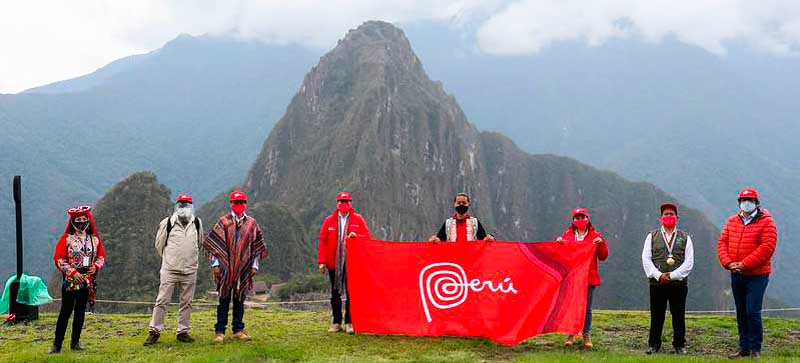
Coronavirus - World Health Organization
What Is Coronavirus?
Coronaviruses (CoV) are a large family of viruses that cause illness ranging from a common cold to more severe diseases such as Middle East Respiratory Syndrome (MERS-CoV) and Severe Acute Respiratory Syndrome (SARS-CoV).
Coronavirus was first discovered in November 2019 in Wuhan, within the Hubei Province of China. On 12 February 2020, the WHO announced that the official name for this specific strain of coronavirus is Covid-19.
On 11 March 2020, the World Health Organization tweeted that they characterized officially the situation as "pandemic".
What Are the Symptoms of Coronavirus?
Fever, cough, and difficulty breathing. If you get these symptoms, call a medical centre in advance seeking medical help. Follow the advice of your local health authority. Stay home if you feel unwell.
Why?
National and local authorities have the most up to date information on the situation in your area. Calling in advance will allow your health care provider to direct you quickly to the right health facility. This will also protect you and help prevent the spread of viruses and other infections.
What Can You Do to Prevent Coronavirus?
Wash Your Hands Frequently
Regularly and thoroughly clean your hands with an alcohol-based hand sanitizer or wash them with soap and water.
Why?
Washing hands with soap or using alcohol-based hand sanitizer kills viruses that may be on your hands.
Keep Social Distancing
Keep a distance of 2 metres from anyone coughing or sneezing.
Why?
When someone coughs or sneezes, s/he sprays small liquid droplets from their nose or mouth which may contain viruses. If you are too close, you can breathe in the droplets, including the COVID-19 virus if the coughing person has the disease.
Avoid Touching Eyes, Nose, and Mouth
Why?
Hands usually touch many surfaces and can pick up viruses. Once contaminated, hands can transfer the virus into your eyes, nose, or mouth. From there, the virus can spread the body and can make you sick.
Practice Respiratory Hygiene
Make sure that you and the people around you follow good respiratory hygiene. It means covering the mouth and nose with a tissue when coughing or sneezing and dispose of the used tissue immediately afterwards. Ideally, use a mask or a respirator to protect yourself and others from infection spread.
Why?
The virus spreads by means of droplets. By following good respiratory hygiene, you protect people around you from viruses such as cold, flu, and COVID-19.
Recommendations
- Wash your hands frequently with soap and water at least 2 minutes.
- Cover your nose and mouth with your forearm or disposable tissue when sneezing or coughing and throw such a tissue away.
- Avoid touching your hands, eyes, nose, and mouth with unwashed hands.
- Avoid direct contact with people with respiratory problems.
- In the presence of mild symptoms (cough, sore throat, and fever), cover yourself and wash your hands. If possible, stay at home.
- In the presence of severe symptoms (respiratory distress and high fever), dial the toll-free emergency number 113.
- Avoid waving or kissing on the cheek.
- Do not self-medicate.
- Clean surfaces at your home, office, or business (eg. tables, bathrooms, floors, toys, etc.) with disinfection (for example, Bleach, alcohol-based agents, etc.).

